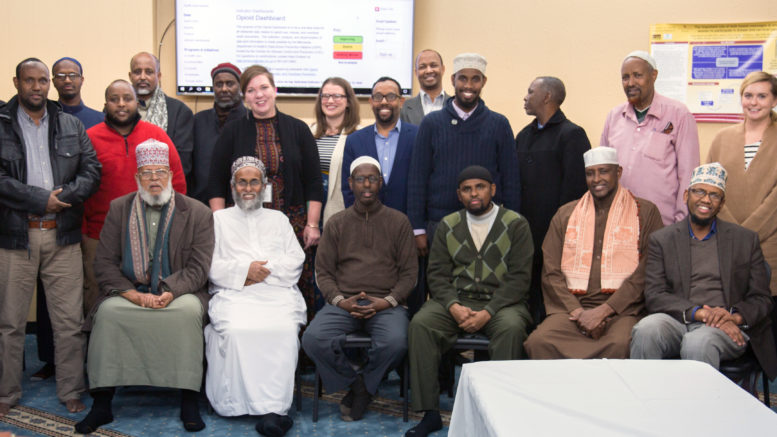Our colleagues in the Health Improvement Bureau at MDH recently completed a series of trainings with several Twin Cities Imams, Muslim faith leaders, to help combat the opioid epidemic ravaging local communities. The team hopes that this project will be a replicable model of how to partner with faith-based communities in the opioid epidemic response, and in understanding substance use disorder, mental health and trauma more broadly.
“Engaging faith leadership to take a knowledgeable stand on the issue of opioid use in our community allows a community’s selected and trusted leadership to serve their people in this important issue,” said Imam Sharif Mohamed of the Islamic Civic Society of America/Dar Al-Hijrah Mosque, which is based in the Cedar-Riverside neighborhood of Minneapolis. Imam Sharif and Kate Erickson, the MDH opioid overdose prevention director, spearheaded the initiative together as part of the Data-Driven Prevention Initiative funded by the Centers for Disease Control and Prevention.
In 2016, nearly 400 Minnesotans died of an opioid-involved death, and prescription opioids remain the leading cause of opioid-involved death. Since the launch of the Opioid Dashboard last fall, Kate has been giving presentations about the opioid epidemic throughout the state, highlighting the data and information included in the Opioid Dashboard to local public health, licensing boards, tribal health directors, regional prevention coordinators, drug-free communities and others. According to Kate, the state had no specific data to point to the need to engage with the Somali community in particular, but she and her colleagues had heard enough anecdotes about risk in the community that they reached out to several local Imams to see if they were interested in learning more.
“We had heard anecdotally that elders had easy access to opioids back home and were confused and frustrated why doctors in Minnesota were hesitant to refill their medications,” Kate said, adding that they also heard stories of young Somali men being solicited to buy illicit drugs. “When I brought the idea to Imam Sharif Mohamed, there was no hesitation – he wanted to bring the education to the Imams, and subsequently, the Imams bring the education to their congregations or communities.”
 Together, Kate and Imam Sharif worked with their colleagues to develop a three-part training for about 20 Imams and leaders in the local Somali community from September through December of last year. The first training focused on data and information included in the Opioid Dashboard and on practical tools and resources in their community, including the nearest safe drop-boxes for disposing of unused medications and how to find mental and chemical health treatment openings using the Fast-Tracker.
Together, Kate and Imam Sharif worked with their colleagues to develop a three-part training for about 20 Imams and leaders in the local Somali community from September through December of last year. The first training focused on data and information included in the Opioid Dashboard and on practical tools and resources in their community, including the nearest safe drop-boxes for disposing of unused medications and how to find mental and chemical health treatment openings using the Fast-Tracker.
“We were amazed by how much information MDH had about the opioid issue and how much less our community knew of this information,” Imam Sharif said. “There is a huge gap between what MDH knows and what is known in our own community.” This partnership is taking the steps necessary to begin closing this gap.
During the second session, the group took a field trip to Alliance Wellness Center, a chemical health treatment facility that specializes in treatment and recovery for East African communities, to see a treatment facility in person. The third session focused on brainstorming what messages the leaders wanted to take back to their mosques and communities, and what action steps they would take to respond to the growing crisis.
“We brought important and new knowledge to our community leaders, and in turn they were able to share that knowledge with the broader communities that we serve,” said Imam Sharif. “These conversations are continuing past the original program effort.”
Both Kate and Imam Sharif remain committed to the work and hope their partnership will serve as a model for addressing the opioid crisis and other health issues with faith-based communities in Minnesota.
“I cannot emphasize enough how important it is that we replicate this effort regarding opioids and truly every major public health issue,” said Imam Sharif. “When public health efforts ignore faith leaders, they signal to the community that they hold disregard for the community’s beliefs and so these efforts begin with a measure of distrust. These trainings must be the model going forward, and if we can replicate these partnerships, we will have a huge capacity to make changes.”

